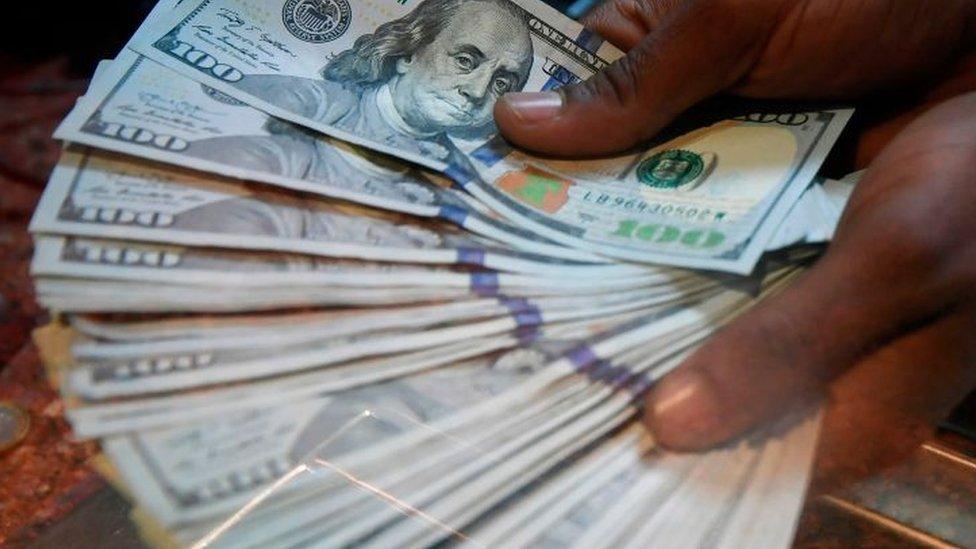Why Kenyans are begging their president for freedom
- Published
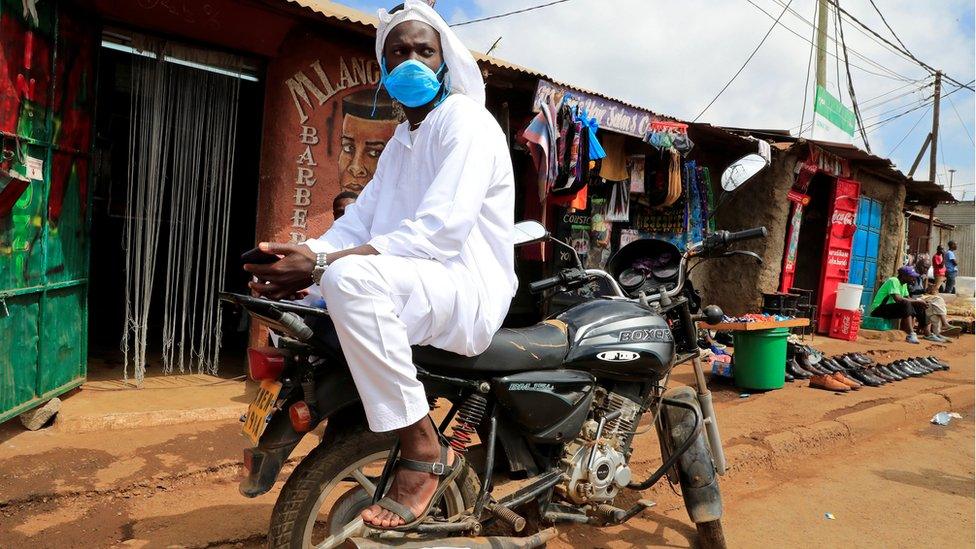
In our series of letters from African journalists, Joseph Warungu captures the frustrations of Kenyans who have been pleading with the government to ease the measures taken to curb the spread of Covid-19.
"Mr President, we beg you - please, please set us free!"
These are not the words of people held in detention or mandatory quarantine after being roughed up by Kenyan police for not wearing face masks.
Instead, it is the cry of many Kenyans who cannot stand the lockdown measures anymore.
Before President Uhuru Kenyatta addressed the nation on Saturday, social media had been awash with memes, pleas and videos urging him to ease the lockdown measures.
Allow X content?
This article contains content provided by X. We ask for your permission before anything is loaded, as they may be using cookies and other technologies. You may want to read X’s cookie policy, external and privacy policy, external before accepting. To view this content choose ‘accept and continue’.

One of the most widely shared clips was a video in Swahili compiled by comedian Mtume Orroson showing him in conversation with the president, external - using old sound bites of Mr Kenyatta completely out of context.
Here is an excerpt:
Comedian: Uhuru, when will you set us free?
President: After three weeks…
Comedian: This is so wrong… you've placed us under curfew then sent police to beat us up.
President: It's not me… I have not sent anyone…
Comedian: Could you at least open up the clubs only - just for a single day so I can sanitise (my throat) with one beer. What do I do when all clubs are shut?
President: Use the back door…
Comedian: Heeey! What if your cops arrest me?
President: You'll have to defend yourself… and these guys don't mess around!
Many people have found the going tough with a night-time curfew in place, restriction on movement into or out of many counties, including the capital Nairobi, and the closure of schools, bars, clubs and places of worship.
About 1.2 million people have also lost their jobs since the pandemic hit the country, with many more having to take a pay cut. Many businesses have closed and families are struggling to make ends meet.
When we decide to sell the food, let's sell it at a very high price - hit them hard"

Indeed, Tanzania's President John Magufuli - who refused to impose a lockdown, and has controversially claimed that the virus has ended in his country - seemed to be alluding to the lockdowns in Kenya and other neighbours when he told Tanzanians: "Some people are experiencing food shortages because they locked themselves up while we were busy farming.
"Now, let's protect our food. And when we decide to sell the food, let's sell it at a very high price - hit them hard! I say hit them very hard!"
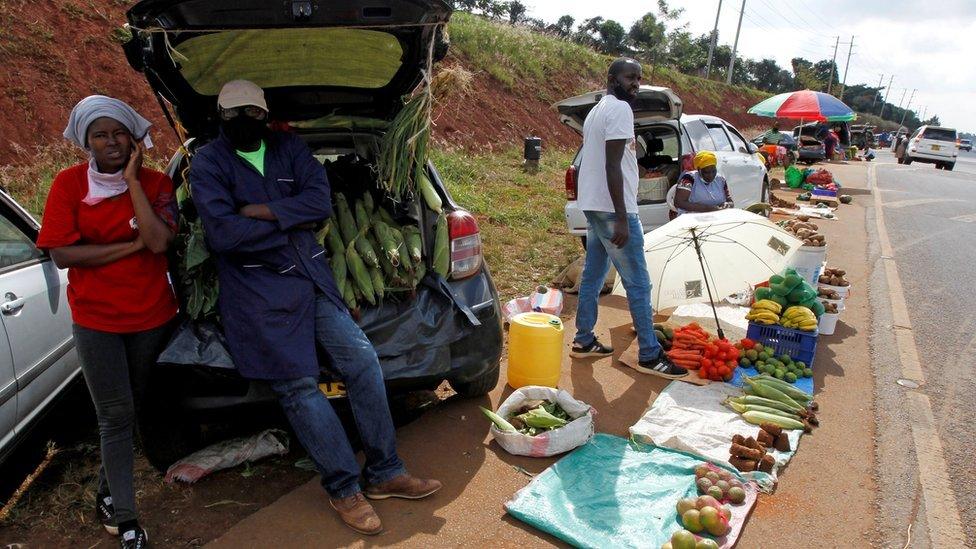
Kenya's economy has taken a knock because of the lockdown
Many in Kenya were therefore hoping that President Kenyatta would reopen key sectors of the economy last weekend.
But choosing the cautious route, Mr Kenyatta only reduced the curfew from 10 to seven hours and eased restriction of movements into certain areas.
President spotted out at night
However, the one sector that has come back to life quickly, to the chagrin of many people, is politics, with Kenyans being treated to some strange happenings last week.
A video clip from a CCTV recording did the rounds on social media.
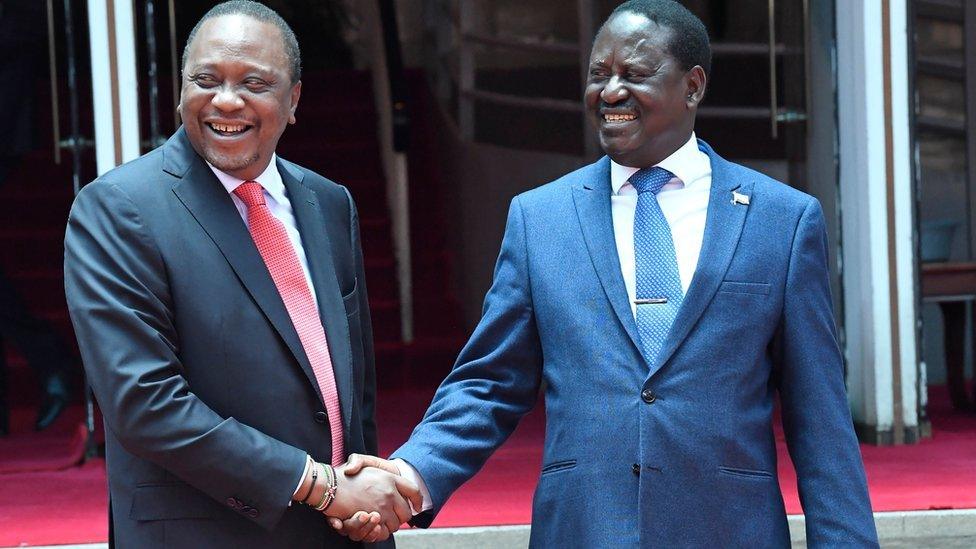
Former rivals Mr Odinga (R) and Mr Kenyatta (L) shook hands in 2018 to end their political rancour
It showed two men who closely resembled Mr Kenyatta and former prime minister and opposition leader Raila Odinga getting out of a car at night to look at road works that have been going on along Kenyatta Avenue in Nairobi, close to the office of the president.
The car carrying the two men was in a small motorcade that included several SUVs and heavily armed police.
The former prime minister is not exactly an essential worker, the category of people who carry an official letter to show police they are allowed to go out at night.
The other category of people who are traditionally allowed to be out in the dead of the night are "night runners". These are people, especially in rural communities, who run about at night scaring and terrorising neighbours.
Neither man,, of course, fits this category.
The incident was the latest sign of political activity beginning to pick up, despite the lockdown.

You may also be interested in:
How Kenyans have adjusted to life under lockdown

Since mid-March when Kenya reported its first confirmed case of the virus, politicians have been hidden away behind masks and their voices muted as the public health emergency, rightfully, took centre stage.
The funerals, which politicians often used as a platform to maintain a public profile, have been drastically cut back under the strict guidelines imposed by government.
But in the last month, politics has been resurrected. This is because Mr Kenyatta is in a hurry. He is due to step down in 2022, and wants to secure his legacy as a champion of national unity and development.
Elbowing out the deputy president
Mr Kenyatta and Mr Odinga have been working closely since their historic handshake in March 2018 to end the bitter disputes and unrest that previous elections had triggered as the two men vied for power.
Deputy President William Ruto is worried that this close relationship could frustrate his efforts to succeed Mr Kenyatta.
As a result, there has been a political bloodbath, with the president uprooting politicians allied with his deputy from key positions, accusing them of standing in the way of his "Big Four" action plan, external.
Many are hoping that politicians will continue to mask their mouths and keep a distance even after Covid-19 is tamed"

Mr Kenyatta's ruthless efforts to secure his legacy has prompted accusations that he is undermining the freedom and independence of parliament and the judiciary.
On Monday, Chief Justice David Maraga braved the political waters and added his voice to those urging the president to "set us free".
Criticising the office of the president for disobeying court orders and acting against the constitution, he said: "It will be a dereliction of my duty if I do not raise Wanjiku's [a reference to an ordinary citizen] agonies in my domain."
While all this is going on, Covid-19 infections are yet to peak in Kenya.
The government says this is likely to happen around August or September when the country could witness up to 200 cases a day.
So clearly this is not a time for political games and many Kenyans are hoping that when the spread of Covid-19 is finally tamed, politicians will continue to mask their mouths and keep a distance from them while they remain focused on finding their next meal.
And they hope that if the president and his opponent-turned-ally take another night walk it will be to inspect roads that lead to jobs.

More Letters from Africa:

Follow us on Twitter @BBCAfrica, external, on Facebook at BBC Africa, external or on Instagram at bbcafrica, external

- Published4 July 2023
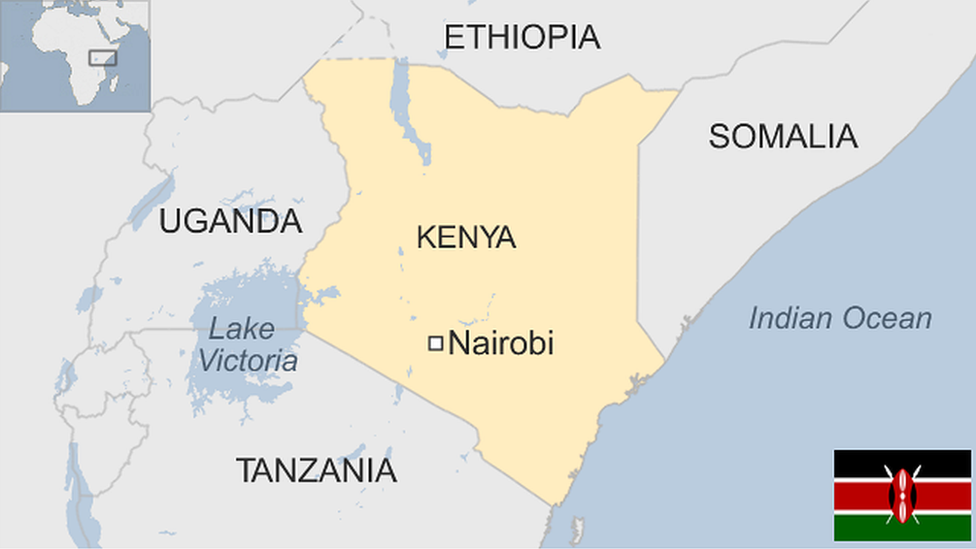
- Published7 May 2020
